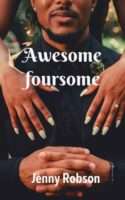And that was how, a week later, Dumi found himself standing in front of a hall packed with students, from shrimpy little Grade 8s, all the way to the back of the hall where Luke Owen and his band of buddies slouched against the wall.
“Hello,” Dumi said into the microphone and it squealed back at him. Mr Allan stepped forward and adjusted it and Dumi started again.
“Hello,” he said. “My name is Dumi Totobela. Until a few weeks ago, most of you had probably never heard my name. Now most of you know who I am, for all the wrong reasons. You see, I’m one of those kids who people don’t see, except when they’re looking for someone to shove against a locker or push out of the way in the hall. You know the sort. One of those geeks who spends more time in the library at school than most people do in their whole lives.”
Dumi looked out over the hall. So far so good. Everyone was listening to him intently. “I’m going to tell you a story,” he continued. “Let’s call it The Sad Story of the Nerd Who Wanted To Be Seen – And How Things Went Terribly Wrong. It all started because of a girl. A girl I really liked, but I didn’t have the courage to tell her.”
Luke Owen sniggered and Dumi stopped and looked at him. “Funny? I suppose so, to most people, but for me it was difficult, seeing her day after day, never having the courage to tell her how I felt. And so I did something really stupid, hoping that she’d see me as someone cool. It was just one small thing I did, or so I thought, but the consequences have been huge and I hurt a lot of people.”
Dumi stared at Luke as he told the rest of his story. He didn’t place the blame on anyone’s shoulders but his own and the hall remained silent as he took them through each step of his story.
“They say we have rights,” Dumi said at the very end, “Do I have the right to express myself freely? Our Constitution says I do. But what if I take that right and trash it, use it to damage or humiliate someone else? Am I still exercising my right to speak freely, to create, say, a cruel image without any fear of punishment or payback?”
It was time to end. Dumi turned to Miss Majola and beckoned her to come forward. “You all know Miss Majola,” he said. “One of the best teachers at this school. And I hurt her and humiliated her and caused her a whole lot of grief. I can’t take that back. I can’t find every copy of the picture that’s on the internet. I can’t delete all the mean remarks and the crude captions. I can’t take any of it back. All I can say to Miss Majola, and to all the people who this picture made a mockery of, is that I’m truly sorry. And I can promise her that I’ll never again take my right to express myself lightly, without thinking about how it might affect other people.
“There’s someone else who this picture affected,” Dumi said, after a pause, “and I’d like to ask that person to join me on the stage now.”
There was a rustle of expectation in the hall.
“I’m sure many of you know who I mean.” Dumi turned to the wings and gestured.
A tall person strode onto the stage and the school burst into shouts and applause.
“My name is Vuyisile Gaba,” he said as the applause died down.
The screen behind him flashed into life and screenshot after screenshot of Facebook comments scrolled in front of the school.
Hey Vuyisile, no wonder you can’t
play rugby, you dickless wonder.
“What if I were transgender or intersex and this was said about me?” Vuyisile Gaba pointed to the comment.
“What if I were gay or a lesbian and these comments were said about me?” He pointed to comment after comment, each as mean and vicious and cruel as the last.
“So far there have been 6 543 comments on Facebook about this picture,” Vuyisile Gaba said, “and not many of them have had anything kind or supportive to say about me. Or about my girlfriend.” He turned to Miss Majola and his lips lifted in a smile.
The screen behind him blanked out then a young girl’s face came up, followed by a young boy’s and then another and another, flashing past so quickly that one blurred into another. And then the screen blanked out again.
“Do you know who those kids were?” Vuyisile Gaba asked. He pointed to a girl sitting in the front row of the hall. “One of those girls could have been you,” he said, “bullied for being a lesbian. Or you,” he pointed at the boy sitting next to her, “tormented for being gay.”
There was a low murmur and Vuyisile Gaba put up a hand. “Each of the young people whose faces you’ve just seen on this screen was bullied. Not face-to-face bullying like some of you bullied Dumi. No, they were attacked online. People said what they liked about them. They thought that because they were sitting in front of their keyboards they were free to say what they liked. The people who bullied them online can fall back on their ‘rights’” – Vuyisile Gaba’s fingers curled into quote marks in the air – “they can say they are allowed to say what they like, because they have ‘freedom of expression’. Just like the people in this school thought they could take a picture of me and my girl and send it around and share it with the world.
“You guys bullied me online, you bullied Miss Majola online. You bullied transgender people online. What’s wrong with being transgender?”
Vuyisile Gaba was on a roll and the hall was completely silent. Not a snigger, not a giggle, not a murmur.
“What makes you, any of you, feel free to make fun of people who are proud of their identities, people who have every right to be accepted for being themselves? Bullying someone online?” Vuyisile laughed derisively. “That’s not freedom of speech, guys. It’s cowardice, pure and simple. Is that what you want to be? A bully who can say things on a Facebook page that he would never say in real life.”
Then behind them, the picture Dumi had sent to Alexa filled the screen. A few sniggers rippled through the hall, but were angrily hushed.
Vuyisile Gaba stepped out from behind the podium. His bare arms gleamed dark and muscular in the lights on the stage, his rugby vest clung to every ridge of his muscled torso.
He motioned to Miss Majola and she stepped forward and looked up at him. “Here we are,” he said. “Does anyone have anything they would like to say?” He looked again to the back of the hall. “Feel free to ‘express’ yourselves’,” he said.
Dumi smiled as he remembered catching Luke Owen’s eye and seeing the look on his face: anger, mixed with embarrassment, mixed with shame. Luke still hadn’t admitted his part in it.
“More hot wind than anything else,” Alex had said dismissively when Dumi commented on this. “Typical bully, just like VG said.”
VG – that was their name for Vuyisile Gaba. And he had been Very Good to Dumi. For starters he said Dumi could continue working at Newlands after his community service time was up, for a proper salary. Then he took Dumi down to the gym and showed him a few basic exercises. He took time to stop and talk whenever Dumi was busy cleaning the locker room or the showers. And, above all, he had appeared in front of the school board with Miss Majola to persuade them to let Dumi keep his scholarship. VG was a good guy.
Dumi’s phone beeped and he picked it up.
Hey Dum-Dum
That was Alex’s new name for him because he had been so stupid. But when she said it to his face, it was usually followed by a swift kiss on the cheek. Nothing much more, but Dumi was happy to live in hope.
Meet me 4 coffee at mall this arvy.
Dumi grinned. He lined up a rugby boot on the bench and tapped the screen of his phone. Then he bent to take a photo.
If I ever get through these.
Cool pic.
Yeh. Not much anyone can do to photoshop a rugby boot.
He smiled as he sent the final message to Alex.
Alex. That’s what Dumi called her these days.
***
Tell us what you think: Have you heard about or experienced internet bullying? What can be done to stop it?







